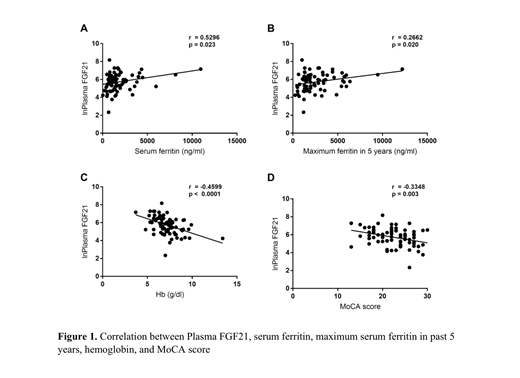Background
Iron overload is the most common complication in thalassemia patients resulted from multiple blood transfusions and increased intestinal iron absorption. Heart and liver abnormalities remain major organs involved in patients with iron overload. There is limited data regarding the association between the iron overload and the risk of cognitive impairment in patients with thalassemia. Fibroblast growth factor 21 (FGF21) is a protein with wide ranging functions, including cell development, cell proliferation, and wound healing. Our previous study reported the FGF21 level was independently associated with cognitive impairment in non-elderly patients with metabolic syndrome. Therefore, the aim of this study is to determine the prevalence and associated risk factors of cognitive impairment in thalassemia patients.
Methods
This study was a cross-sectional and single-center study. All thalassemia patients, age 18 years or older, who attended the adult hematology clinic, Faculty of Medicine, Chiang Mai University, between November 2018 and July 2019 were enrolled in the study. The diagnosis of thalassemia was based on a hemoglobin analysis using a high-performance liquid column chromatography (HPLC) method. Patients who had pre-existing neurological disorders, psychiatric problems, history of brain surgery or history of traumatic brain injury were excluded from the study. Cognitive function was assessed using the Montreal cognitive assessment (MoCA) test. Data regarding age, sex, type and severity of thalassemia, level of education, transfusion status, maximum ferritin in the past 5 years and current medications were collected. The laboratory investigations included complete blood count, reticulocyte count, serum creatinine, electrolyte, liver function test and serum ferritin were performed at the time of enrollment. Blood samples for FGF21 level were collected from all participants.
Results
A total of 76 thalassemia patients were enrolled in this study. Seventy percent of patients were female with a median age of 31 years old (18-59). More than half of patients were graduated with a bachelor's degree. Beta-thalassemia/hemoglobin E disease was the most common type of thalassemia. Splenectomy was done in 48.7% of patients. Majority of patients (76.3%) developed iron overload and were treated with iron-chelating agents. Median serum ferritin and maximum serum ferritin in past 5 years were 1,418.5 ng/ml and 1,945.0 ng/ml, respectively.
Mild cognitive impairment (MoCA score <26) was observed in 76.3% of patients. Median serum ferritin and plasma FGF21 levels were 1,463.0 ng/ml, and 390.10 pg/ml, respectively. Plasma FGF21 level was positively associated with serum ferritin and maximum serum ferritin in past 5 years, but showed a negative correlation with hemoglobin level. Interestingly, MoCA score was negative associated with plasma FGF21 level and was not different among type of thalassemia, splenectomy, gender, transfusion status, and hemoglobin level (Figure 1).
Conclusions
A high prevalence of mild cognitive impairment was occurred in thalassemia patients (76%). FGF21 level was independently associated with cognitive impairment in thalassemia patients. Therefore, the possible role of FGF21 level in cognitive impairment in thalassemia patients should be further investigated.
No relevant conflicts of interest to declare.
Author notes
Asterisk with author names denotes non-ASH members.


